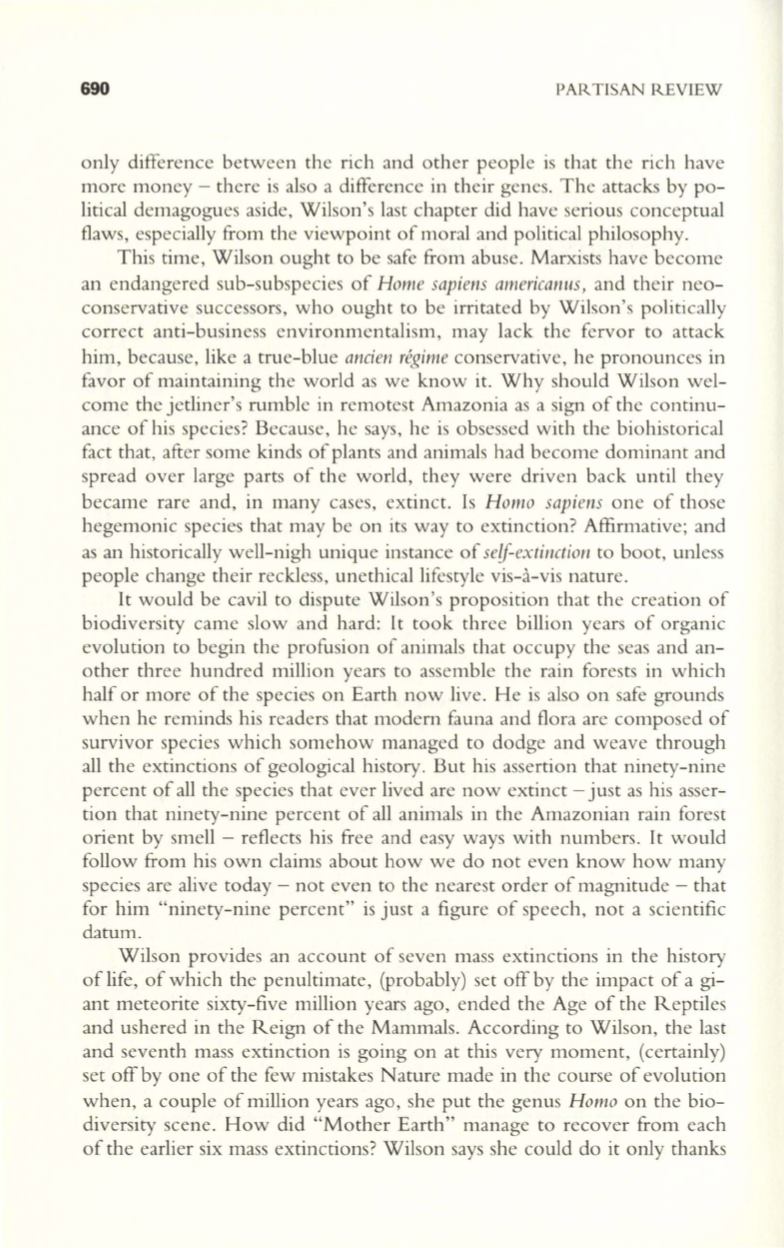
690
PARTISAN REVIEW
only difference between the rich and other people is that the rich have
more money - there is also a difference in their genes. The attacks by po–
litical demagogues aside, Wilson's last chapter did have serious conceptual
flaws, especiaJJy from the viewpoint of moral and political philosophy.
This time, Wilson ought to be safe from abuse. Marxists have become
an endangered sub-subspecies of
Home sapiens american us ,
and their neo–
conservative successors, who ought to be irritated by Wilson's politically
correct anti-business environmentalism, may lack the fervor to attack
him, because, like a true-blue
ancien regime
conservative, he pronounces in
favor of maintaining the world as we know it. Why should Wilson wel–
come the jetliner's rumble in remotest Amazonia as a sign of the continu–
ance of his species? Because, he says, he is obsessed with the biohistorical
fact that, after some kinds of plants and animals had become dominant and
spread over large parts of the world, they were driven back until they
became rare and, in many cases, extinct. Is
Homo sapiens
one of those
hegemonic species that may be on its way to extinction? Affirmative; and
as an historically well-nigh unique instance of
self-extinctioll
to boot, unless
people change their reckless, unethical lifestyle vis-a-vis nature.
It
would be cavil to dispute Wilson's proposition that the creation of
biodiversity came slow and hard:
It
took three billion years of organic
evolution to begin the profusion of animals that occupy the seas and an–
other three hundred million years to assemble the rain forests in which
half or more of the species on Earth now live. He is also on safe grounds
when he reminds his readers that modern fauna and flora are composed of
survivor species which somehow managed to dodge and weave through
all the extinctions of geological history . But his assertion that ninety-nine
percent of all the species that ever lived are now extinct - just as his asser–
tion that ninety-nine percent of all animals in the Amazonian rain forest
orient by smell - reflects his free and easy ways with numbers.
It
would
follow from his own claims about how we do not even know how many
species are alive today - not even to the nearest order of magnitude - that
for him "ninety-nine percent" is just a figure of speech, not a scientific
datum .
Wilson provides an account of seven mass extinctions in the history
of life, of which the penultimate, (probably) set off by the impact of a gi–
ant meteorite sixty-five million years ago, ended the Age of the Reptiles
and ushered in the Reign of the Mammals. According to Wilson, the last
and seventh mass extinction is going on at this very moment, (certainly)
set offby one of the few mistakes Nature made in the course of evolution
when, a couple of million years ago, she put the genus
Homo
on the bio–
diversity scene. How did "Mother Earth" manage to recover from each
of the earlier six mass extinctions? Wilson says she could do it
only
thanks


